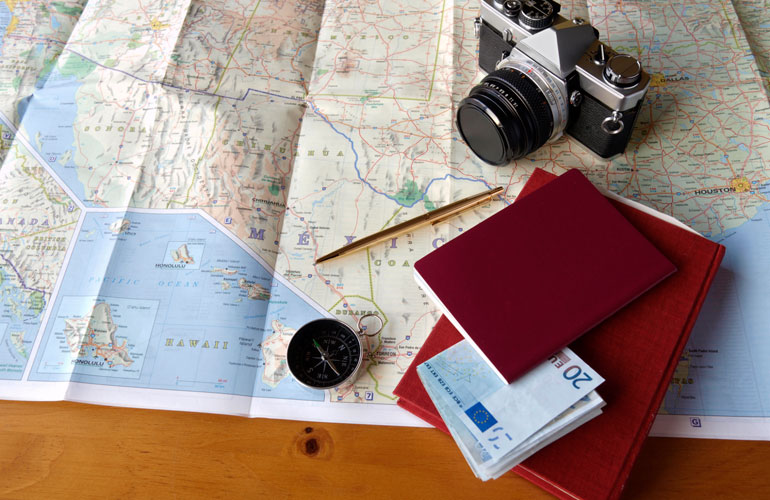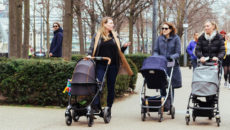Virtually all adoptive parents travel to meet their new child, to a nearby city, to another state, or to a distant country.
The adoption trip is a defining moment in a family’s life, the event that brings parent and child together at last. This event usually takes place in unfamiliar surroundings, which makes it all the more memorable — and stressful.
Adoptive Families asked veteran adoptive parents, those who have made the journey and lived to tell the tale, for their best travel advice, suggestions that go beyond packing lists and sightseeing recommendations. They came up with a collection of ideas that are wise — and sometimes surprising.
10. Get in shape, and stay that way.
If you are traveling for your first child and you are not adopting a newborn, you may be surprised to learn how hard it is to carry a 15-20 pound baby. More than one new adoptive parent has wound up in the doctor’s office with muscle strain.
Kari Blackburn adopted her son in St. Petersburg, Russia, and she was glad she prepared. “Our son was almost 18 pounds when we adopted him at nine months. I had been lifting weights and that helped.” She adds, “What I didn’t anticipate was lower back pain. My dad suggested that I buy a back support belt such as warehouse employees wear. I hardly notice that I’m wearing it, and the back pain is gone. Now Christian is over 26 pounds and loves to be picked up, held, and carried around.”
9. Choose your traveling companion wisely.
If you are not traveling with a spouse, you should consider bringing a friend or relative to help. Be sure to choose someone whose temperament, health, and enthusiasm are suited for this important and demanding job.
Mary Nell Ryan traveled with her four-and-a-half-year-old daughter to adopt a second daughter; her sister-in-law, Rhonda Wallingford, came along to help. Ryan says, “Your travel partner should be able to fill lots of different roles: babysitter for the older child or for the new child, videographer, pack mule, psychologist (for the new parent), and personal secretary, to make sure the brain-dead mommy remembers all the papers and passports and extra diapers and stuff that are necessary each time you leave the hotel room.”
8. Be prepared before you get “the call.”
John and Lucy Baldi traveled to Texas to adopt baby Melissa. “Make a list of all those things you will need to take, as you might do when going on vacation, but add to that list any special documents and baby items you will need,” says John Baldi.
“Have as many of them as possible already packed and ready to go at least a month before your due date.” He adds, “Even though you may feel superstitious, have your baby’s room ready, so that when you return home from a successful adoption you can spend your time adoring your new baby, rather than assembling the crib, arranging furniture, and running to the stores.”
7. If you’re staying a while, make yourself at home.
Some states and countries require parents to make several trips or stay for long periods of time to complete an adoption. Antonia Chappell and her husband have made several trips to Guatemala in the process of adopting their baby son, and she suggests looking for ways to reduce expenses.
“Many hotels offer discounts to adoptive families. Ask your agency if they have a special rate with any hotels,” she says. “There are often fully furnished apartments available to rent on a short-term basis for much less than the cost of a hotel room. We rented a three-bedroom apartment in a very nice, secure complex.”
You can also use your social contacts from home to make your stay more friendly. Timothy D. Swanson is an adoptive parent of daughters from Chile and Paraguay and president of Federal Travel, an agency specializing in adoption travel.
He suggests, “If you are a member of a service club, such as Rotary International, attend the local chapter’s meetings. The members will be willing to help you in any way they can. When we were in Santiago, Chile, I regularly went to the Rotary Club de Providencia’s weekly meeting. From the friendships we made, we were invited to the club’s Christmas party and to a member’s home for dinner. This kind of interchange widens your horizons and helps you to feel more at home.”
6. Research your destination ahead of time.
Timothy Swanson says, “Invariably your birth mother goes into labor at 2:00 a.m. and you need to be there now. To get the cheapest available airfare with the fewest problems, you need to do your homework. Your travel professional can help you find out what airlines fly into the destination airport and when they depart.”
“Determine how long it will take you to drive from your home to the airport and where you need to park when you get there. If you are using alternate means of transportation, ensure that it is available on short notice. Find out about rental car rates and the location of the hospital or adoption agency, so you can decide what hotel you want to stay in. Having all of this information in advance will help reduce your anxiety level when the call comes.”
5. Give your older child affection and appreciation.
If you take your older child with you, pack an ample supply of activities and treats. Even more important, reassure the big sibling that you still have time for her and that you appreciate her help with the new child. Mary Nell Ryan says, “Make time for ‘special times’ with just the older child — swimming or shopping or whatever.”
Ryan also suggests giving your child some choices. “Really involve the older child in the choices and process of the new baby. Have her pick out clothes for the baby to wear. Let her pick out some special souvenirs for herself and special gifts for the people back home. It will help her remember the amazing journey and give her additional ‘control’ over a pretty uncontrolled situation.”
4. Reassure the child left at home.
For a child who is accustomed to seeing you every day, a long absence can be upsetting. Young children may have difficulty understanding the passage of time. Shoshana Dornblaser and her husband left their four-year-old daughter with her grandmother when they traveled to adopt her little sister.
“My daughter and I made a paper chain with a link for each day Mommy and Daddy would be gone,” says Dornblaser. “Each link was labeled with a date. Every morning she would tear off the link for that day. This helped her get a feel for how much longer it would be before we returned.”
In addition to frequent phone calls, leaving behind a daily reminder of your love helps. When Sandy Rappeport left her older daughter behind for a 21-day trip to adopt her younger daughter, “We set up a ‘Mommy’s treasure box,’ and I put one little present in the box for each day (coloring books, crayons, a yo-yo, etc.). She loved opening something every day. She also marked each day on the calendar. In addition, I tape-recorded myself reading her favorite stories, which she sometimes listened to at night.”
3. Buy it when you see it, and get it home safely.
Though shopping may be the last thing on a tired new parent’s mind, whether you travel to New Mexico or a more exotic destination abroad, bringing home something to remember the trip by usually proves irresistible.
Ruth Williams Hennessy, who adopted her son in Vietnam, says, “These really are once-in-a-lifetime opportunities.” If you see something you like — well-made jewelry, crafts that are especially representative of your child’s original home, unusual artwork — don’t count on finding it at a better price or a different location.
To bring your treasures home safely, take an empty duffel bag or buy an inexpensive suitcase at your destination and pack new purchases in it. Barb Ohland also suggests taking along a cardboard poster tube, available from office and art supply stores.
She says, “While you are there, you can purchase local art, and have a safe way to get it home. I bought some beautiful original paintings in Vietnam when we adopted my son. They are now treasured family items. I packed all my things in a soft-sided duffel bag, and my art tube fit inside nicely.”
2. Don’t rely on your memory.
After the stress of being in a strange place and caring for a new child, you may not remember the details of the journey, and still photos won’t capture the sounds, smells, and feelings you’ll experience. Take the time to keep a record of your trip.
Elisa Criden says, “While waiting for Lily, I kept a journal and brought it with me. I tried to write every day. When they took Lily’s footprint in red ink, they stamped her foot on the back cover of my journal. I love that little footprint!”
Ruth Williams Hennessy found a dual purpose for e-mail: “We e-mailed almost every day, and those e-mails became the bulk of our ‘journal’ of the trip. What I will do differently next time is print a copy of each of those e-mails and tape ticket stubs, receipts, etc., to each page as we go along.”
And Keyena McKenzie suggests, “Bring a hand-held tape recorder to record an audio journal: street sounds, taxi music, your observations of the scenes around you, and of course, the first coos, babbles, words, and so on.”
1. Take along your sense of wonder.
If you can face surprises and keep your composure, you’ll have a more enjoyable trip and be a better parent. Think of adoption travel as an adventure, much like the reality show Survivor. Ruth Williams Hennessy stresses the importance of a having “a sense of humor, ability to adjust to new situations, and interest in the culture around
And even if things go wrong — you miss your connecting flight, you wind up with an unpleasant gastrointestinal bug, your baby throws up on his last clean outfit when you still have four hours of flying to go — you can console yourself with one thought: this trip will make a great story someday.






